 (3.91 avg; 11 ratings) rate it
(3.91 avg; 11 ratings) rate it
 (3.38 avg; 12 ratings) rate it
(3.38 avg; 12 ratings) rate it
 (2.61 avg; 55 ratings) rate it
(2.61 avg; 55 ratings) rate it
Barbara Lin’s New York Times crossword—Jenni’s write-up
We got trouble right here in Crossword City. That’s trouble that starts with a T that rhymes with P that stands for…pool! All the theme entries contain terms heard around a pool table.
- 11d [Bar from the bathroom?] is TOWEL RACK.
- 20a [“Jeez, lighten up, will ya!”] is GIMME A BREAK.
- 34d [Alert] is ON THE BALL.
- 38a [As expected] is ON CUE.
- 55a [Like medical expenses you pay for yourself] is OUT OF POCKET.
And the revealer (which I initially missed because I filled it in with crossings and didn’t notice it): 64a [Game suggested by the ends of 20-, 38-, and 55 Across and 11- and 34-Down] which is, of course, POOL.
Solid (sorry), consistent, accessible Monday theme that was enjoyable to solve. Nice! Pretty much what I’ve come to expect from Barbara Lin’s puzzles.
A few other things:
- We ATE IN last night, for a change. Sigh.
- My daughter is 21. If she ever noticed that it says OPER below the 0 on a phone dial, I doubt she knows what it stands for.
- Is the [State school SE of Columbus] actually called OHIO U?
- I have a colleague who regularly uses ALL CAPS in Email correspondence and chart notes. I haven’t figure out a polite way to tell her it feels like she’s shouting at us.
- Not a big fan of entries like G FLAT but at least the crossing was entirely fair.
What I didn’t know before I did this puzzle: that element 41 was named after NIOBE.
Fred Piscop’s Los Angeles Times crossword — Stella’s write-up
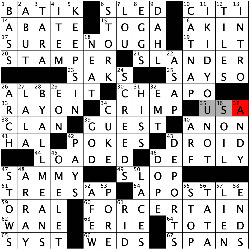
Los Angeles Times 2/22/21 by Fred Piscop
This one feels so straightforward it doesn’t even belong in the Los Angeles Times on Monday — more like Newsday. Not much to explain — all four theme answers are clued as [“Really!”] and each theme answer is something that you might mean if you say “Really!” Like so:
- 17A: SURE ENOUGH, in the “It really is!” sense of “Really!”
- 60A: FOR CERTAIN, in the “Yes, really!” sense. Does anybody really (heh heh) exclaim “For certain,” though? This just seems like a way to avoid duplicating the word SURE.
- 11D, I KID YOU NOT, another “Yes, really, it’s true!” one.
- 28D, BY ALL MEANS, has the sense of “Really, go ahead!”
As you’d expect from someone who’s been doing this as long as Fred Piscop has, the fill is super smooth and easy — and it’s no mean feat to fill a puzzle to make it this easy, so I’ll give him that. I just wasn’t grabbed by the theme at all, and I do wish there’d been more women represented in the grid. How about Sophie DAHL instead of the ever-present Roald? Or LA LA Anthony? If those are too hard for Monday, surely there’s a TARA to choose from between Reid, Lipinski, Parker-Pope, or a fictional character without returning to the Gone With the Wind well again. (Don’t hate me, progressive friends, for I do love that novel very much — but I would also love to see other ways to clue that name.)
Anna Shechtman’s New Yorker crossword – Rachel’s writeup
This solve was a comedy of errors on my part. There were a bunch of places where I tried to guess based on a few letters, sometimes with hilarious results, detailed below. I really like the long entries today, but there were just a few places where the clues and/or entries didn’t work for me, so although some parts of this puzzle were pretty snazzy, overall, it wasn’t my favorite.
Starting with the good (long) stuff: We have OCTAVIA BUTLER and DOROTHY ARZNER in the long down positions, as well as SOLAR SYSTEM and SHORT-LISTED. These are all great! I had never heard of DORTHY ARZNER (uncultured brute that I am), so some of the letters in her last name gave me a hard time, but with a little creative googling I got there eventually. Other nice longer entries include MICRODOSE, LOST TRIBE, MARIOKART, BOATYARD, NOLLYWOOD, EXERTIONS. Nice, crunchy, fun entries.
During the solve, I made a bunch of confident and dead wrong guesses throughout, starting with [First science-fiction author to receive a MacArthur “genius” grant] as URSULA K LEGUIN instead of OCTAVIA BUTLER, entered with no crosses (maybe file away for the future the fact that these two authors have names of the same length because, uh, that seems like a good thing to know if you intend to solve puzzles I wrote in the future…! (this is not a Boswords spoiler)). Other completely incorrect guesses include:
- GAY BARS as [Sites of some bachelorette parties] instead of DAY SPAS
- SODA VOLCANO [Many a science-fair diorama] instead of SOLAR SYSTEM
- DAILY [How some jokes are delivered] instead of DRILY
That last one was the error that lingered after my solve, until I finally wrapped my head around DRILY, which….is not spelled like that in American English, but makes about as much sense as DAILY (some people get DAILY jokes delivered in their email, right?).
Now for the not-so-great: The biggest issue, to me, is the casual reference to phrenology without any indication that it’s a deeply racist pseudoscience in the clue [Phrenologist’s interest] for HEAD. This seems like a serious oversight. Also irritating, during the solve, was DE TROP without any indication that it’s French. I mean, maybe some people say this without a trace of irony in English, but… those people are DE TROP ?. I also think calling CIS and TRANS “opposites” in their cross-referenced clue is not quite right. Gender isn’t a linear spectrum with CIS and TRANS on the poles—it’s vastly more complicated than that, for many people—so this angle didn’t really work for me. Finally, the clue for NICEST doesn’t totally click either. I get that a “nice point” can be a “precise distinction” but I’m not sure that works in the superlative form.
A few more things:
- I don’t think the word “famed” in [Famed French battle site in the Hundred Years’ War] is doing CRECY any favors. It’s a pretty obscure piece of fill, and I think you might as well lean into it instead of telling the solver it’s famed!
- Curious about [First word in all of 9-Down’s novels] being THE for Donna TARTT‘s novels. THE seems like a common enough word that this is probably true for many authors? Interested to hear your thoughts on this.
- Favorite clues:
- [“Coal Miner’s Daughter” and “What’s Love Got to Do with It”] for BIOPIC. I didn’t know this, but it’s a clever misdirect!
- [Drop just a drop?] for MICRODOSE
Some solid stuff here, especially in the long entries, but a couple of missteps detracted from the overall success of the puzzle. Several stars for the long entries, though!
Kyle Dolan’s Wall Street Journal crossword, “Middle School”—Jim P’s review
YOUR / INNER / FISH is today’s theme (36a, [With 37- and 39-Across, book and TV series on human evolution, and a hint to the circled letters]). I don’t know this PBS show based on evolutionary biology, but leave it to the Head of Science and Innovation at the British Consulate General in Chicago, to come up with a good science-based theme. The other theme answers have fish hidden within well-known phrases.
- 17a. [Fitness trainers design them] WORKOUT ROUTINES
- 25a. [Degree seeker’s ordeal] PAPER CHASE. I like this one best. The fish is not one we see too often in crosswords and the base phrase is a fun one.
- 45a. [Question before wrapping up a Q&A] “ANYONE ELSE?”
- 58a. [Foot-stamping performers] FLAMENCO DANCERS
This is a really good example of a hidden word theme. It’s generally better when each word is different, and we have not one, but two solid bases for the theme: the revealer and the title. The longer hidden words are more interesting of course, but all the base phrases are good here.
Fave fill: “I CAN’T NOW,” SOUR BEER, PEDANTS, and LEOPARD.
I got hung up in that SW corner. 53d is clued [Exhibiting good judgment], and I was stuck on either SANE or possibly SAFE (as opposed to the correct SAGE). The crosser is [Music for a sitar] and I tend to forget the meaning of RAGA, so RANA seemed perfectly plausible (probably because I was conflating it with “Rani”). Further complicating things was that I didn’t know the Taylor Swift song next door [Taylor Swift song that takes a swipe at sexism]. Was it THE MAN or THE MEN? (Turned out to be the former.) Anyway, being a Monday, if 53d had a straightforward herbal clue, that would’ve made that corner much simpler.
Aside from that hang-up, this was a nice, smooth grid with an enjoyable theme. 3.9 stars.
Susan Gelfand’s Universal crossword, “Makes Connections” — pannonica’s write-up
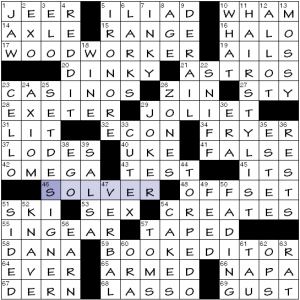
Universal • 2/22/21 • “Makes Connection” • Gelfand • Mon • solution • 20210222
Not sure I understand the theme 100%, but it seems simply to be occupations with clues employing the verb makes as part of an idiom, which is taken literally.
- 17a. [Someone who makes the cut?] WOODWORKER.
- 11d. [Someone who makes waves?] HAIRSTYLIST.
- 25d. [Someone who makes a scene?] SET DESIGNER.
- 59a. [Someone who makes a long story short?] BOOK EDITOR.
Okay that works.
-
5a [Tale about Troy] ILIAD. 1a [Taunt] Hector wasn’t always a bully. In Homer’s Iliad, the eldest son of King Priam of Troy was a model soldier, son, father, and friend, the champion of the Trojan army until he was killed by the Greek hero Achilles. How did the name of a Trojan paragon become a generic synonym of bully? That pejorative English use was likely influenced by gangs of rowdy street toughs who roamed London in the 17th century and called themselves “Hectors.” They may have thought themselves gallant young blades, but to the general populace they were merely swaggering bullies who intimidated passersby and vandalized property. By 1660, hector was being used as a noun for the sort of blustering braggarts who populated those gangs, and as a verb as well.. The way Achilles dragged Hector’s body around behind his chariot to taunt the Trojans, hence the verb hector.
Uh-oh. I just looked it up to confirm, and it turns out I’ve been mistaken all these years:
“Hector wasn’t always a bully. In Homer’s Iliad, the eldest son of King Priam of Troy was a model soldier, son, father, and friend, the champion of the Trojan army until he was killed by the Greek hero Achilles. How did the name of a Trojan paragon become a generic synonym of bully? That pejorative English use was likely influenced by gangs of rowdy street toughs who roamed London in the 17th century and called themselves ‘Hectors.’ They may have thought themselves gallant young blades, but to the general populace they were merely swaggering bullies who intimidated passersby and vandalized property. By 1660, hector was being used as a noun for the sort of blustering braggarts who populated those gangs, and as a verb as well.” (m-w.com)
So I guess we can blame the inconsistency on those ignorant Brits.
- 26a [Cab alternative?] ZIN. Ernet, meet Fandel. 18d [Goblet filler] WINE. 66a [Valley north of San Francisco] NAPA.
- 29a [City southwest of Chicago] JOLIET, which I know exclusively from the opening scenes of The Sting.
- 1d [Teeth holder] JAW. This weird clue stalled me for a bit, but it’s perfectly accurate.
- 6d [Small songbirds] LARKS.
- 9d [Go off the track] DERAIL. But for some reason I put in DETOUR, which ironically derailed me for a few moments.
annnnd… Time for me to make tracks.
Brendan Emmett Quigley crossword (No. 1342), “Themeless Monday #609” — Jenni’s review
I struggled a bit with this one. Of course, it’s yet another day of slippery driving in the snow and I solved this over lunch while fielding phone calls, so maybe it was me. I did enjoy the struggle as I almost always do with Brendan’s puzzles.
What I noticed:
- 1a [Stopped from advancing, as Lion] is TACKLED. This is one of those clues that is difficult because it’s grammatically contorted. I presume the Lion in question has something to do with Detroit football, which means it would either be a lion or the Lions. It’s harder without the article and also – not quite right.
- A BEQ music reference I actually know! That’s because Frank and Nancy SINATRA recorded “Somethin’ Stupid” in 1967 and my mother adored Frank Sinatra, so it was on regular rotation in our house. I thought it would be a nice trip down memory lane and when it started to play I realized it’s actually intensely creepy. It’s a love duet recorded by a father and a daughter. Eeuw.
- Misleading plural alert at 33a. [Plotting planners] are a CABAL.
- The long across answers are CRAFT CANNABIS and CHOPPED SALADS. Is that what you eat when you have the munchies and you’re worried about calories?
- 60a [Adjusts, as a g-string] is RETUNES. Music, not thongs.
What I didn’t know before I did this puzzle: never heard of CRAFT CANNABIS before. Also did not know that Peggy on “King of the Hill” has a niece named LUANNE or that Ralph Waldo Emerson said that AMERICA was “another name for opportunity.”
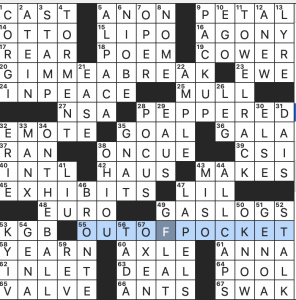
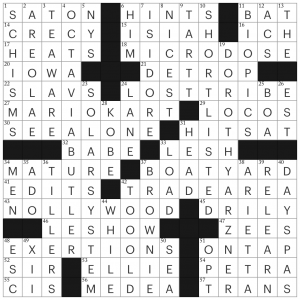
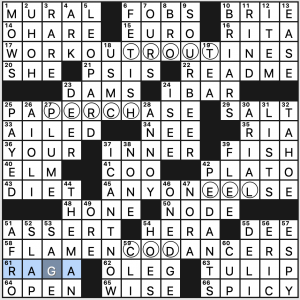
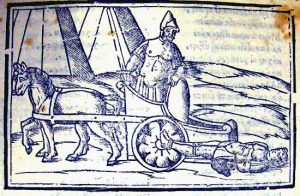
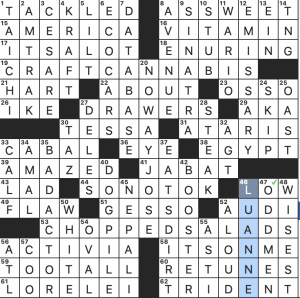
NYT: French for water is eau, whose plural is eauX. In general, fill is sub par on that one. Niobe is excellent, if a tad on the tough side for Monday
I also had “eaux” before realizing what was going on.
Looking online, it appears the consensus is that EAUS is NOT a valid word in American English, although it’s a bit confusing to websearch.
It also appears that it is NOT in the Official Scrabble Players Dictionary, which is used in the US, but it IS in Collins Scrabble Words, which is used in the UK.
I don’t think it’s a legitimate French plural – I think EAUx is the only option in French.
I agree. If one is using a French word, it certainly should use the French pluralization.
Agree, mostly. If the clue had been ‘Evian et Perrier’ then definitely. But with ‘and’ rather than ‘et’ one can make a plausible counter-argument.
No WSJ today? Anyone else?
It is in the paper
Was there for me.
http://herbach.dnsalias.com/wsj/wsj210222.puz
It took them a long time for them (WSJ) to get it up on their website, but it’s there now.
I do appreciate the cooler fill in Anna’s New Yorker puzzle—OCTAVIA BUTLER, NOLLYWOOD, SHORT-LISTED, MICRODOSE—but I’d be content to sacrifice some of the sparkle in favor of smoother fill overall. The puzzle starts with SAT ON (like HITS AT, a not-great phrase made by tacking a preposition onto a verb—though SAT ON has more cred than HITS AT) crossing AREOLAE and TEAWARE (that’s a thing??), which in turn cross the contrived SEE ALONE. This same corner has CRECY and NYS. Too much!
tho i also struggled in the nw (lookin’ at you CRECY…), have to express my appreciation for a “monday level” that was actually challenging in addition to being well-made. it may not be a “perfect” puzz, but for getting the challenge part right, more mondays like this, please!
also, re: TEAWARE (and *strictly* fwiw), see this ngram —
https://books.google.com/ngrams/graph?content=tea+set%2C+teaware&year_start=1800&year_end=2019&corpus=26&smoothing=3&case_insensitive=true#
;-)
NYT: @Jenni … As a born and bred Ohioan (and current resident), I can confirm that OHIO U is one way to refer to Ohio University. I more commonly use just OU, but I think folks use both terms. In case your question (confusion?) has something to do with Ohio State University, they’re different schools and both are publicly-funded. Ohio State’s main campus is in Columbus whereas OHIO U is in Athens. When I read the clue, I assumed that Will and/or Barbara were trying to add just little misdirection into the grid.
As a born and bred Ohioan, I was pleased to fit OHIO into the grid. My original clue referred to a school in Athens, because I couldn’t resist the misdirection. That was rightly made easier for a Monday puzzle.
Thanks for the review, Jenni.
As an Ohio University grad, I can confirm that it’s usually referred to as OU, and only occasionally OHIO U when avoiding confusion with Oklahoma University or Ohio State University.
As someone who is not from Ohio and barely spent any time there, I have no real knowledge of or familiarity with the abbreviations for the state university.
I have driven back and forth across Ohio a number of times (spoiler alert: it’s big!) and have spent a night a motel in Toledo. Even so, I too have no opinion on abbreviations for the state university.
Oooh, making fun of Ohio, never heard that before. Do you have any jokes about airplane food, too?
I don’t know why you think I was making fun of Ohio. I was just making a silly comment because of all the people weighing on the correct abbreviation for OSU.
But don’t get me started on Indiana…
Nice one. You almost had me with your “I was just making a silly comment” and then you called it OSU. Nasty.
Just fyi. Cis- and Trans- are indeed opposites, regardless of how they have been (very recently) applied to gender identity. Cis is a prefix meaning “this side of” and trans means “the other side of.” They have been used primarily to describe the orientation of double bonds in chemical isomers, until the term cisgender was popularized.
Jenni – duets are sung by many. Father Nat King & Daughter Natalie Cole’s “Unforgettable” duet comes to mind. One can listen to the lyrics of Unforgettable & cringe or just & appreciate the sonorous blending of similar familial vocals.